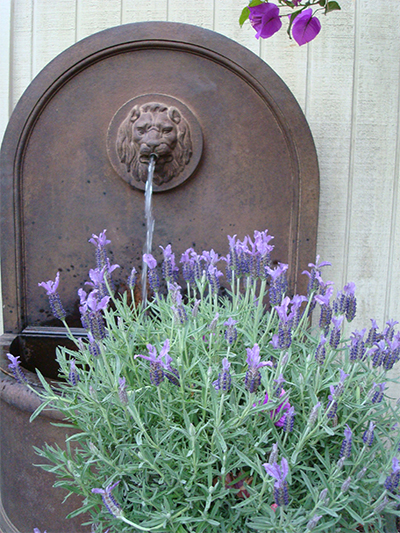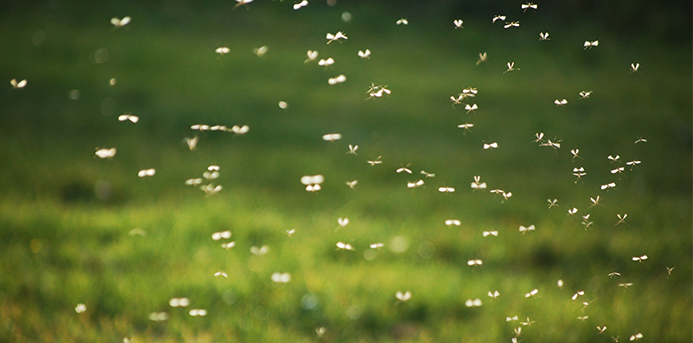Just when the weather breaks and you’re finally able to enjoy the outdoors, that familiar, aggravating hum arrives. You can’t see them, but they’re there, waiting for the perfect moment to strike. You slap your ear, swat the air and ultimately let those pesky mosquitoes drive you back to the safety of the great indoors, the very place you couldn’t wait to escape only weeks before.
According to the Centers for Disease Control and Prevention, as of Sept. 3, 2016, approximately 2,382 cases of Zika virus had been confirmed or suspected in the United States. Ninety-nine percent were travel-related. Aedes albopictus, a mosquito species found in Illinois, is less likely to carry the virus than Aedes aegypti, which populates the southern states.
Once a female mosquito mates, she has one thing on her mind: blood. It provides the protein needed for egg maturation. Unless you stop breathing (she’s drawn to carbon dioxide, lactic acid and octanol, which are present in every exhalation), there’s little chance you’ll go unbitten this summer. Research has revealed that consuming one beer makes you even more attractive. Pregnant? Your elevated body temperature and 21 percent more carbon dioxide in each breath are beacons. And those with Type O blood are two times tastier than Type As.
Taking a proactive approach to mosquito management, especially in concert with neighbors, can help make landscapes as inhospitable to pests as possible. Here are some top tips for keeping mosquitoes at bay around your yard.
1. Walk the Yard
Every week, take a stroll around your property and be on the lookout for standing water. It only takes one bottle cap of water for her eggs to find a home. Empty pot saucers and check for water in sandbox toys. Drill a few holes in the bottom of tire swings to allow drainage and empty birdbaths. It’s also a good idea to give them a good scrub to dislodge larva that might be attached to the basin. Make sure gutters and downspouts are free of debris.
Rain barrels properly fitted with screening at the opening will prevent mosquitoes from entering and a few mosquito fish added to a pond or water garden will keep populations in check. A Mosquito Dunk is also an effective addition to small ponds and birdbaths where its active ingredient kills larvae and lasts for 30 days or more. It’s safe for birds and fish, too.
2. Harness the Power of Fragrant Plants
Jennifer Brennan, horticulture information specialist at Chalet Nursery, says customers are often disappointed that plants said to repel mosquitoes seem to fall short.
“You cannot just plant them in your yard,” she says. “A plant’s fumes and essence have to be dispersed by rustling the leaves.”
She says containerized plants placed on a table beneath an umbrella are especially effective as the umbrella helps the scent to linger in the seating area. Even rubbing the leaves will release the plant’s oils that can then be dabbed on various parts of the body to help repel mosquitoes. Herbs like mint (mojito anyone?), basil, lavender and rosemary are great choices and can do double duty. Brennan’s favorite, lemon balm, releases a fresh lemon scent when walked on or rustled, but she cautions its aggressive nature, a common quality in the mint family. She recommends sinking containers planted with mint into the garden so that the lip of the container sits about 1.5 inches above the grade of the soil.
“The stems are easily cut when they jump the edge,” Brennan says. “It’s a neat trick for any invasive plant.”

3. Take Extra Precautions For Special Occasions
Jim Dunbar, owner of a Chicago-area Mosquito Joe franchise servicing the northern suburbs, sees an uptick in business around major summertime events like the Fourth of July and graduation parties, when customers are looking for a little extra help. The company offers two types of barrier sprays, one derived from the extract of chrysanthemum flowers and an all-natural treatment he says is safe for pollinators. Both are effective against fleas and ticks.
Depending on the chosen method, treatments are effective for 14 to 21 days, and he recommends having the yard treated 24 to 48 hours before an event.
“Just like anything else, if we get four days of rain, the application window is less,” Dunbar says.
As part of his service, Dunbar says he likes to walk the property with the homeowner to help them identify possible nesting sites for mosquitoes.
“Homeowners don’t realize just how much they can do themselves,” he says.
It Doesn’t Stop With Your Yard
While the above tips will definitely help reduce the mosquito population around your yard, you are still going to want to protect yourself and your family by using insect repellant and wearing protective clothing. Here’s all you need to know about the best insect repellants and ways to protect your family.
If you’re worried about Zika specifically, here is more information about the virus itself and ways you can help prevent its spread and give support to those who have been affected.
And if those pesky little biters and fear of Zika get you down this summer, considering planning a getaway to one of these fabulous Zika-free destinations!
 Heather Blackmore is a garden field editor for Country Gardens and Outdoor Living magazines. Her work has been featured on Good Morning America as well as in the Chicago Tribune, Chicagoland Gardening and Garden Guide magazines. A lifelong athlete, Heather is a former college rugby and volleyball player and enjoys weightlifting and an active lifestyle. When she’s not working in the garden, she and her husband enjoy attending their daughters’ many band, lacrosse and show choir events. Heather is also a long-time supporter of St. Jude Children’s Research Hospital.
Heather Blackmore is a garden field editor for Country Gardens and Outdoor Living magazines. Her work has been featured on Good Morning America as well as in the Chicago Tribune, Chicagoland Gardening and Garden Guide magazines. A lifelong athlete, Heather is a former college rugby and volleyball player and enjoys weightlifting and an active lifestyle. When she’s not working in the garden, she and her husband enjoy attending their daughters’ many band, lacrosse and show choir events. Heather is also a long-time supporter of St. Jude Children’s Research Hospital.

